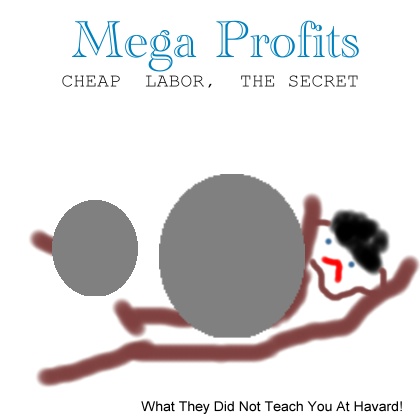Cheap Labor, Mega Profits
Somewhere through the road on globalization, corporate enterprises found a way to increase profits without sweating. In the 'earlier' days you would need to hunt for new markets, then came the days when you had to increase efficiency, follow the just-in-time inventory policies etc. There was a more painful way of increasing corporate profits and that was by investing in research and development, they called in innovation.
After going through the above grind it was still not easy to please Wall Street investors, so corporate houses jumped on another band wagon. You did not have to do a media blitz, hiring and maintaining an expensive R & D unit was also not required. All you needed to do was to make the same old products, probably package and name them in a more trendy outfit and more importantly look for cheaper places to manufacturer those same products. Then came the third world countries, they could produce your product more cheaply, it was a hidden treasure that was soon known by every corporate enterprise today.

Cambodia, July 2010 : A T.V report shows a garment export factory, more than 2,000 factory workers have stopped working and are demonstrating outside they factory. They demand that the management increase their minimum monthly wages from around 65 U.S$ to a 100 U.S$. Remember that we are talking about MONTHLY wages and not weekly or daily wages. If you presume that each of these workers work for 8 hours a day, their per hour wages are around 40 cents or 0.40 U.S$. Thailand a neighbouring country has a minimum wage that is around 2.5 times more than the Cambodian minimum wage. Many big corporate enterprises have already shifted operations to Cambodia to harvest the cheaper wages bonanza there.
Pakistan: Also a U.S ally in the war or terrorism, this country has something very special to offer to the world. Children below 12 years are enslaved in the carpet industry, the markets are Europe and U.S. The payment made to the children is so little, you could say that they worked free. Big brother U.S has some laws on importing merchandise from 'sweat shops', basically production units where conditions are as bad or worse than slavery. If you forgot what slavery means, it was something that Abraham Lincoln abolished before he was shot dead. Slavery is banned in the U.S but it was a cheap source of labour. So if you want to make use of cheap production by enslaving workers, you cannot do it in America. You will have to move to Pakistan where it is rampant and well known. Merchandise produced in such factories in many third world countries is channeled through a number of countries, to blur the information related to the country of origin! So when you furnish the White House cabin with one of those luxury carpets, you can at least pretend that you don't know where they come from. Did someone say, 'from Hong Kong'? We never heard of that though!!
When it comes to the condition of factory workers, China is classic case study. Already piped as the production center for the globe, the country has it's own way of reducing costs. Corporate enterprises rushing to China for production contracts are fully aware of the conditions of labor they. And yet they seem to wake up only when someone dumps some factual information on the internet!
China: Have you seen the fanfare with which Microsoft announces every single business move that it implements. Check out the computer shows in Asia, spanky Microsoft booths, sexy babes holding Microsoft products. You will even find posters screaming at you about the dangers of software privacy. The founder of this giant is one of the planets richest persons.
In April 2010, there was a report on the condition of labour in a Chinese factory producing Microsoft accessories like the famous mouse. The factory had many workers who were below 16 years, some of them were even as young as 14 years. No official registration was done for such underaged workers. The workers were forced to work upto 15 hours a day on low wages which were as low as 0.65 U.S$ per hour. Many ot them worked for 6 to 7 days a week.
All this so that corporate offices of Microsoft could get cheap products that they could sell at a high price. More money for the owners and happiness for share holders. Something like a win-win situation?
No secret: The information in this article is no secret, governments know it, the giant corporations know it, the shareholders know it and even the consumer knows it. The point is that even the U.S and European nations would love to follow such repressive technics in their production centers, but their laws do not permit it. So they look for countries who are willing to do the dirty work for them.
Management schools: Wonder if the management schools today teach these new but shady ways to make corporate profits. After all, a company doing it the old way by investing in R&D, increasing efficiency, implementing new technology and motivating workers will take some while and financial investment to see true results. In a world economy where, time is money short cuts through any means seem to be the rule of the day.
But there could be bad news for these huge enterprises, labor unrest is growing within China. International attention is being drawn to these repressive measures adopted by the Chinese in a bid to become the world's production center. U.S and European corporations might need to wipe the dust of their management books and look for more conventional ways to earn profits. A painful road ahead but one that will be more sustainable in the long run.
If you have any comments on this article, email us at easyrambler@rocketmail.com We will be glad to hear your point of view.
